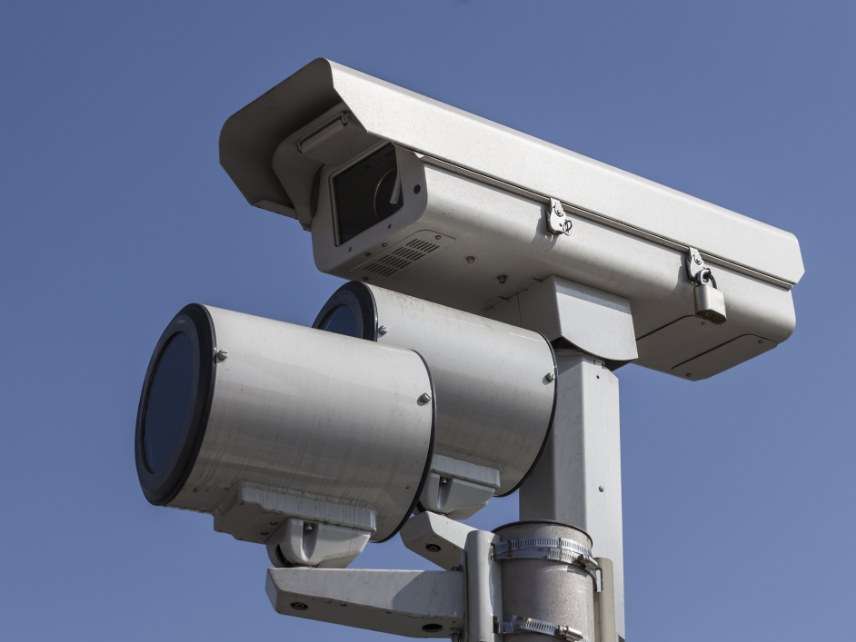Chicago to Give Back Millions in Traffic Camera Fines
The latest setback for one of the most corrupt citation systems in the country

Chicago's use of red light cameras to shake every possible cent out of its citizens took a hit this week. The city has agreed to a $38.75 million settlement to end a class action suit by people who say they hadn't been given adequate notice of violations to respond to them.
The Chicago Tribune reports that as many as 1.2 million people may get refunded half of what they paid to the city.
The plaintiffs contend that the city didn't send second notices to people who had gotten red light tickets before declaring them guilty, as the regulations required. The suit also says the city was doubling the fines for late payments before it was supposed to.
The city's response to the complaint was pretty telling: It changed the ordinance so that the city didn't have to send a second notice at all. Then, to cover their asses, Chicago lawmakers passed an ordinance giving those who had gotten tickets prior to 2015 permission to challenge them. The city took in nearly $300 million from traffic camera citations in 2015; they didn't want to give up that money without a fight.
This suit was rather limited, considering the many, many problems Chicago has had with its red light and speed camera systems. The Tribune has been on top of these problems:
Zolna's suit was among half a dozen cases that followed a Chicago Tribune investigation of corruption and mismanagement within the city's $600 million red light program. The series exposed a $2 million City Hall bribery scheme that brought the traffic cameras to Chicago as well as tens of thousands of tickets that were unfairly issued to drivers.
The investigation found malfunctioning cameras, inconsistent enforcement and millions of dollars in tickets issued purposely by City Hall even after transportation officials knew that yellow light times were dropping below the federal minimum guidelines.
Throughout the scandal, the Emanuel administration has been reluctant to issue refunds, in some cases forcing drivers to file paperwork and apply for a rehearing process some critics have called onerous.
A former city official has even gone to prison for bribery over the implementation of the system. $10 million of the money that will pay for the settlement will come from the cash the city itself will get from the private red light camera company Redflex, in a completely different settlement over the bribery scandal.
The Tribune previously researched what the cameras actually accomplished for drivers. The safety results turned out to be terrible. The city actually saw a 22 percent increase in rear-end crashes, and many of the cameras had been implemented in intersections with no notable history of problems with collisions.
Chicago's implementation of red light cameras makes it abundantly clear—if it's not already—that the purpose of these programs is not public safety but raising money for the city by sucking it out of the pockets of its citizens.
Or at least the citizens it has left. The Chicago area has been bleeding population for the past two years, losing more residents than any other major city in the country.
Editor's Note: As of February 29, 2024, commenting privileges on reason.com posts are limited to Reason Plus subscribers. Past commenters are grandfathered in for a temporary period. Subscribe here to preserve your ability to comment. Your Reason Plus subscription also gives you an ad-free version of reason.com, along with full access to the digital edition and archives of Reason magazine. We request that comments be civil and on-topic. We do not moderate or assume any responsibility for comments, which are owned by the readers who post them. Comments do not represent the views of reason.com or Reason Foundation. We reserve the right to delete any comment and ban commenters for any reason at any time. Comments may only be edited within 5 minutes of posting. Report abuses.
Please to post comments


At press time city officials had not yet finalized their next plan to fleece their citizens.
But Fist has already finalized his comment for the article to follow.
Seat of my pants, as always.
I guess that's one way they can raise revenue without having to pay tons of interest.
Chapman hardest hit.
You know who else was bleeding population for years?
Cambodia?
Zimbabwe?
King George III?
Transylvania?
Vendikar and Eminiar VII?
Elizabeth B?thory?
Re alt text: because someone would stick their penis in there. Trust me.
Ahem. Someone?
"What a bizarre and lazy article. There was nothing about history of Chicago - how it began, why it was built so close to a lake, etc - and nothing about the history of red light cameras - who invented them, who installed them, what do they do - and not too many details about how the cameras were installed in they city, or why they were installed, etc. If a writer doesn't include background details, they are stupid. Because the writer was lazy and stupid, I shall begin expanding on what he didn't explain." 1/417
Make sure you stand your ground even after it's obvious that you are the only person on earth who didn't understand the article.
Yeah, Crusty, stand your ground like you are a white Hispanic.
+1 gently-used KelTec
cold...and funny...and cold.
Let me guess - the $38.75 mil is 30 for the lawyers and the rest is "half-off your next traffic ticket" coupons for the class.
Dallas stuck me with one for turning right on red. Dummies.
Thank god for applications like Waze that allow users to mark the locations of traffic camera's for other users. Just having the application open has been pretty darn handy around Dallas.
indeed.